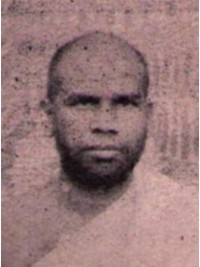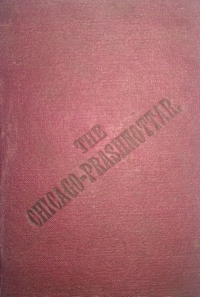26. Question:
Objects have neither existence nor non-existence.
Answer:
Do you accept the usual meanings of the terms existence and non-existence or attach some other meaning of your own to them. If you accept the usual sense of these terms you will have to admit that where a thing does not exist it is non-existent and when it exists it is not non-existent- These two propositions are contradictory. If you reject one you must admit the other. Here is no scope for an indescribable unreality. If you attach your own meaning to these terms, the matter does not affect us because when the term and the object denoted by it appear in the artificial sense you have imposed on them the usual sense of the word and the object denoted by it would never be absent. How would you then prove the phenomena to be indescribably unreal? If the indescribable unreality is not proved, how can phenomena be proved unreal. Nor can only one Brahma be proved.
27. Question:
I call that to be indescribable which is not visible.
Answer:
Your position is highly self-contradictory. If the phenomena are not visible, why did you accept them as visible and having attributes in your former statement. If you ask what contradiction there is in accepting them as visible and having attributes, then your statement that what is not visible is indescribable would fall through. When the phenomena are not indescribable, then either they would be existing in form or non-existing in form. In accepting either of these two positions you will again be driven on to either of the two fallacies of "Perverse Knowledge" and "Real Existence" alluded to above. I ask you again whether your belief in holding the phenomena as indescribable is based on direct or indirect proof. The direct proof shows the phenomena as they appear i.e., really existing. As are the objects, so is their cognition by direct proof and each object of the phenomena is existing in regard to its own form and non-existent in regard to other objects. All these objects existing separately from one another form what is called Prapanch Phenomena. This being the case how it is possible on the basis of direct evidence to prove the phenomena to be indescribable.
28. Question:
The direct evidence cannot rebut my former position on the other hand it strengthens it. If direct evidence were to show that the nature of one object does not exist in another object then it would weaken my position.
The direct evidence is not of this nature as it does not show that the nature of one object does not exist in another object.
Answer:
Your statement is untenable. You cannot have the knowledge of the true nature of an object without negating the nature of a different object in it. You can have an idea of blue colour only when you negative in it yellow or other colours. When you become cognisant of the real nature of an object by direct proof, then only you can deny the existence of other objects therein. You cannot know the true nature of an object unless you realise the negation of another object therein. In fact to realize the true nature of an object is to negative the existence of a different object in it. When the direct proof admits of both existence and non-existence of an object, the phenomena can never be proved real. When the phenomena cannot be proved real, the Supreme spirit who is only one without the second cannot be proved. If you considered the direct evidence proving only the existence of things you will also have to admit the existence of nescience just like the existence of knowledge. Your statement that Brahm is proved without nescience by direct evidence also shows the negation of nescience by the same proof. It being so, your statement that direct proof indicates only existence and not non-existence is like the statement of a mad man. Now as regards your indirect proof what is argued later on will repudiate it. My position is that the phenomena are not an illusion being opposed to unreality. What is opposed to unreality is real such as the soul. Similar is the case with the phenomena. Your argument relating to the cognition of things is opposed to the existence of Supreme Being in as much as the Supreme spirit is not perceptible but at the same time not unreal. If you say that the supreme spirit is imperceptible then it is indescribable. If it is not indescribable, your position becomes untenable, because your expostulation is that there is nothing else besides the Brahma and that the supreme Atman is invisible. In your former argument you gave an example of a mother of pearl. That example is inapplicable in as much as the mother of pearl is included in the phenomena which you consider to be unreal. An example ought to refer to a thing which is capable of being proved. It is not yet proved whether the existence of the mother of pearl is real or unreal. Such being the case you cannot give an example of it. Further I ask you whether the argument you put forward to prove the unreality of phenomena is included in the phenomena or not? If not included, is it real or unreal? If real, then the phenomena too like your argument are also real. If unreal, is it a void or an example of "Perverse knowledge" or something inexpressible? The first two propositions are not conducive to what is to be proved; they are just as the horns of a man or the silver in a mother of pearl. As regards the third statement relating to indescribability, it cannot in the first place be possibly thought of, then it cannot prove the point at issue.
29. Question:
My proposition is true from a common sense view; therefore it cannot be wrong and is calculated to prove its object.
Answer:
I ask you to let me know the form of this common sense view. The word Vyavahara derived from its root means nothing else than knowledge. Whatever is real by means of knowledge is intrinsically real. This view proves the phenomena to be real. When the phenomena are real, it cannot be said that only one supreme Brahma without a second is real and all else unreal. If you say that the use of the word is true, I ask you whether the word is real or unreal. If you say that the word is real, then the phenomena are as well real as the word. If you say that the word is unreal, such words as Brahm &c cannot be real because that which is itself unreal cannot be the cause of anything that is real.
30. Question:
Just as a false coin points to the transactions in genuine coins, so does our view though false, point to the reality of the phenomena. It therefore proves its object.
Answer:
0! friend your statement makes your argument really false. All the fallacies pointed out in connection with the unreality of the phenomena, would again arise here. If you argue that you do not consider your reasoning separate from the phenomena, your reasoning is certainly unreal like the phenomena and it cannot prove its point. What has been explained before does not prove the phenomena to be unreal, they are real like souls and your position that only one Brahma without a second is real and all else false, falls to the ground.
 Shrimat Vijyasandsuri
Shrimat Vijyasandsuri
